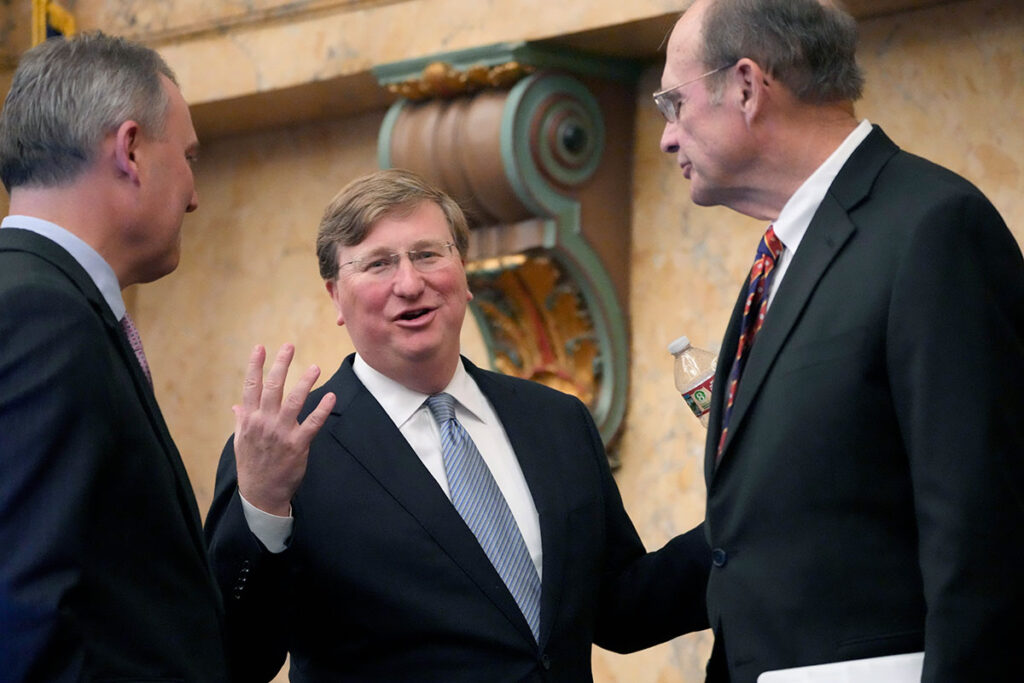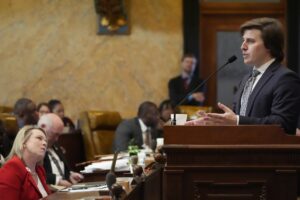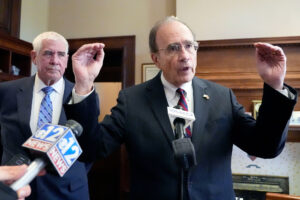Using public-education dollars to pay for private school tuition is again at the center of a debate in the Mississippi Legislature as lawmakers push new “school choice” legislation—with vocal support from the governor.
“We must be innovative. We must be open to new and different models,” Gov. Tate Reeves said during his annual State of the State Address on Monday, Feb. 26. “We should fund students, not systems. We should trust our parents, not bureaucrats. And we should embrace education freedom.”
House Education Committee Chairman Rob Roberson, R-Starkville, authored House Bill 1449, known as “The Mississippi Student Freedom Act.” The bill would create “Magnolia Scholarship Accounts” providing funds for students to attend a nonpublic school. The program is designed to be phased in over five years. Beginning in the 2025-2026 school year, program participation would be limited to a maximum of 1.5% of the number equal to the 2022-2023 total public school student enrollment. The bill would increase that percentage by 1.5% each year.
For the 2025-2026 school year, students of Mississippi residents would be qualified if they were eligible to enroll in kindergarten, were enrolled in the public school system or an Educational Scholarship Accounts program the previous year, and met the eligibility criteria for Medicaid of the Children’s Health Insurance Program. The next year, any child who would be eligible to enroll in public school could participate.
Each quarter, an amount not to exceed 25% of the state per-pupil funding average would be deposited into the students’ accounts. An included provision would allow for more than the allotted 25% to be deposited during the first quarter of the school year for curriculum, textbooks and other educational expenses.
The bill would require students to take an annual standardized test. However, the responsibility would lie with parents or guardians to ensure testing is done and submitted to the Department of Education within the required time frame.
Voucher Debate Dates Back to Segregation
School vouchers have long been a contentious issue in the state. Faced with being forced to comply with court-ordered school integration, segregationists in the 1960s and 1970s began pushing to use taxpayer funds to cover private-school tuition.
In early 1964, when members of the Citizens Council held a majority of the state legislature, lawmakers passed a $185-per-child voucher program to allow them to attend a “non-sectarian” private school. White families used the funds to send their children to newly opened segregation academies (like the ones U.S. Sen. Cindy Hyde-Smith and former Gov. Phil Bryant attended) until a federal court struck down the program in 1969.
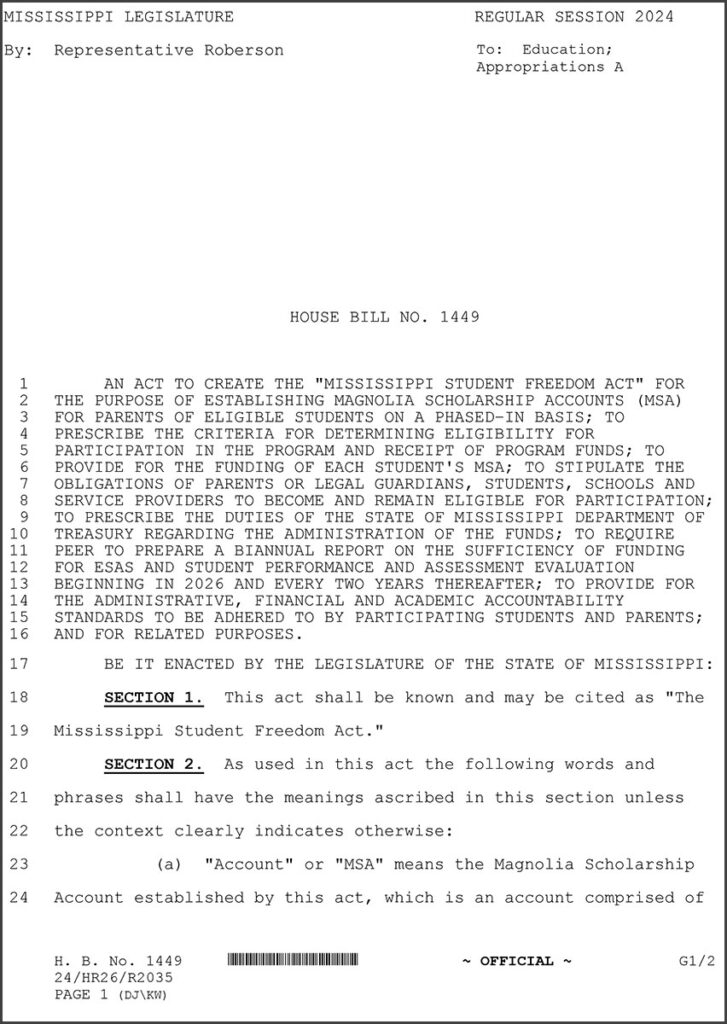
The push for “school choice” has continued to gain traction over the last two decades even after federal courts decided private schools could not legally refuse non-white students (still, many remain overwhelmingly white). In 2015, Mississippi lawmakers created the Education Scholarship Account Program, allowing parents of special-needs children to use appropriated funds to pay for private-school tuition and education-related services. Families can use the funds on tuition or as an expense “to provide an organized appropriate educational program with measurable goals to their participating students in at least the subjects of reading, grammar, mathematics, social studies, and science.”
In 2019, the Legislature extended the law. Parent’s Campaign Executive Director Nancy Loome told the Jackson Free Press at the time that a major concern for opponents was that private schools are not required to meet any standards to be eligible for the program. They are not required to admit special-needs students or to provide special-needs services to ESA recipients attending their schools.
“The law says that, in order to be eligible to receive the voucher, the parent must forfeit the child’s right to special education services, which is absurd on its face,” Loome told the Mississippi Free Press in a Jan. 23 interview.
Loome provided data showing that, of the 1,595 vouchers that had been assigned from the program’s inception through June of 2023, only 619, or 38.81%, were used. Each ESA voucher account was worth $7,089 for FY2024.
‘A Big Push Around the Country’
A 2018 legislative PEER review found that parents often struggled to use the vouchers listing reasons such as private schools not admitting their children or being unable to afford the tuition balance left after the use of the voucher. Many of the schools that received ESA funds did not offer special-education services.
“One of the things that we see in every state, including the stepping in every state that has passed these voucher programs, is that private schools raise their tuition,” Nancy Loome told the Mississippi Free Press.
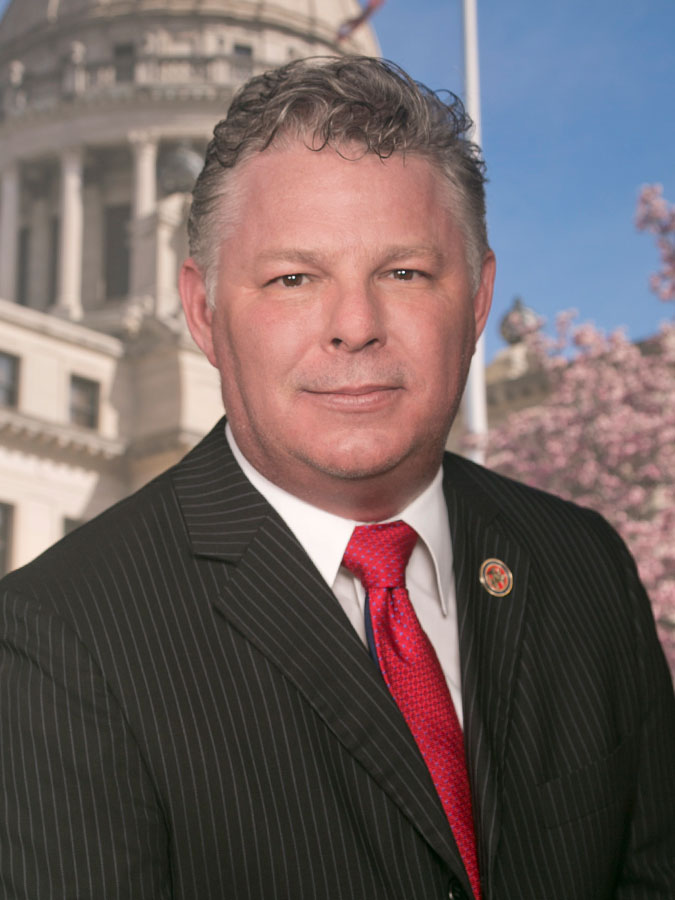
The Mississippi Supreme Court is currently considering the constitutionality of a $10-million appropriation of public funds to the state’s private schools using COVID-19 relief funds. The Independent Schools Infrastructure Grant Program was created to help private schools pay for water, broadband and other infrastructure projects. The Legislature arranged for the funds to be distributed under the oversight of the Mississippi Department of Finance and Administration. Attorneys for the MidSouth Association of Independent Schools, the state’s private school association expressly named in the legislation, said the court’s ruling could affect “school choice” in the state.
“School choice is a big push around the country in Tennessee in some other states,” Liberty Justice Center Senior Counsel Buck Dougherty told the Mississippi Free Press on Dec. 20. “This ruling could kind of pave the way for more legislation in Mississippi for advancing school choice. Whether it’s through charter schools, vouchers, school choice (or) ESA. They’re all kinds of different ways to have education for freedom and then school choice.”
Rep. Roberson also authored House Bill 1452, the “Opportunity Scholarship Program,” designed to provide scholarships to low-income students who attend sectarian or nonsectarian private schools. A scholarship-granting organization the Mississippi State Board of Education appoints are to administer the funds.
Students are eligible to receive the funds if they attended a public school rated “D” or “F” the previous school year and in two of the previous four years and if the student’s family’s income does not exceed 250% of the established poverty level. The student must have already been accepted at a private school and must request the funds before July 1 of the first year in which the student intends to use the scholarship.
Loome doubts the legislation will help those it is written to influence.
“Those kids who live in poverty are not going to benefit from these vouchers,” Loome said. “They don’t in other states that have passed a similar law citing the same thing. And what we see time and time and time again is that vouchers benefit wealthier students and those who live in wealthier zip codes.
‘Every Child Deserves a Quality Education’
Rep. Rob Roberson also introduced a Mississippi House bill to eliminate the current school funding formula, the Mississippi Adequate Education Program, and replace it with a new one that would also introduce some school-voucher funding. House Bill 1453, the “Investing in the Needs of Students to Prioritize, Impact and Reform Education Act of 2024,” would change the current education scholarship accounts program. In the current system, parents must pay tuition funds upfront but would receive reimbursements. Mississippi House Speaker Jason White said that under the proposed plan, the state would pay the cost upfront. He said that the program would initially limit the number of students who could participate and that the funds would not cover the full cost of tuition.
“It would be the current per-student cost (of) the state share, OK, which is about 73%,” White told Lucien Smith on SuperTalk Mississippi’s Feb. 19 edition of The Gallo Show.
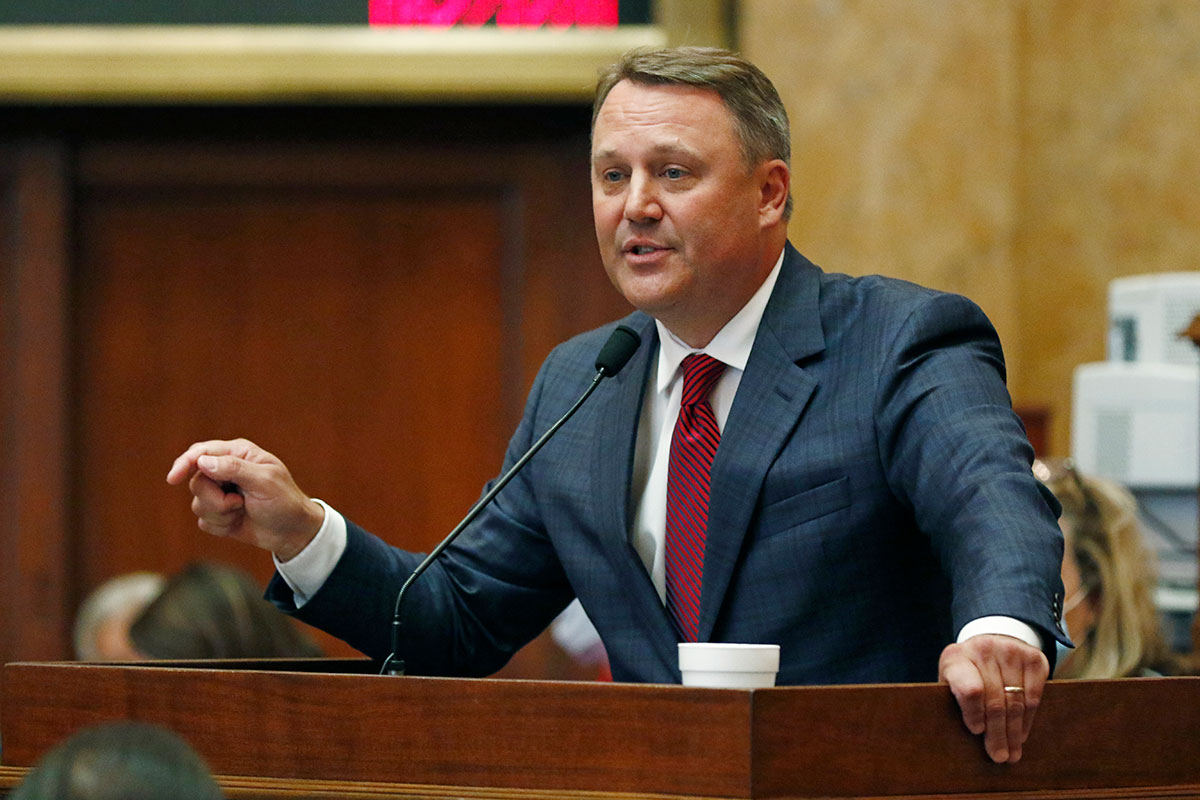
White said he disagreed with the argument that school vouchers harm the public-school system.
“Half of our students aren’t going to just leave their local home school districts. People prefer their local public school,” White said on The Gallo Show. “There’s no denying that. Nobody’s trying to undo that. This is simply recognizing that there are people who have different needs for their kids, and there are places in the state that don’t have the same choices.”
But the Parent’s Campaign’s Nancy Loome says there will be no need to offer school choice or portability if the state does what it should for schools.
“It is the obligation of the State to provide every child a good education,” she said. “… The answer is to provide every child a great school, not to say some kids who are lucky enough to be able to move around can.”
If any of the House’s voucher bills did pass in the lower chamber, they would still need approval in the Senate before they could go to Reeves’ desk for his signature.


